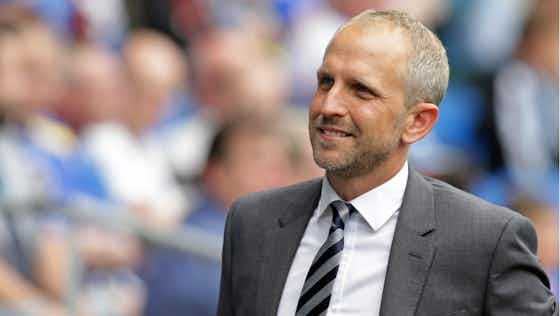Football League World
·28 September 2024
Cardiff City's 5 worst ever managers (Ranked)

In partnership with
Yahoo sportsFootball League World
·28 September 2024

FLW reviews the five worst permanent managers in Cardiff City's history by win percentage
Cardiff City have endured an extremely high turnover of managers over the years, underlining the perennial instability which continues to plague the Bluebirds.
Indeed, under Vincent Tan alone, Cardiff have gone through 13 permanent managers in just 14 years.
Turkish boss Erol Bulut was the latest casualty at the mercy of the trigger-happy Malaysian owner, receiving his marching orders after leading Cardiff to five defeats from their opening six matches of the 2024/25 Championship campaign.
The vast majority of Cardiff's managerial appointments tend to be ill-fated ones. There have been some rare successes, of course - such as Neil Warnock, who masterminded the most improbable Premier League promotion in the 2017/18 season - but it is difficult to ignore just how many times Cardiff have got it wrong with their hires.
That, unfortunately, is a theme that followed the Bluebirds long before Tan's takeover of the club in 2010. Bulut's tenure at the Cardiff City Stadium may have ended in miserable fashion, but the Turk does not even come all that close to measuring in the club's five worst managers of all time, which we have decided to summarise by the metric of points per game.
*For reference, the criteria for the list is bosses who were appointed on a permanent basis and managed no less than ten matches, and only managers that have full data on Transfermarkt.

Getting the ball rolling here is Sabri Lamouchi who, it must be said, cannot be categorised as an ill-fated appointment by Cardiff under any circumstances.
The ex-Nottingham Forest boss arrived following the dismissal of Mark Hudson - more on him later - and fulfilled the job required of him, which was to keep Cardiff in the Championship. They were staring down the barrel of relegation at the time, of course.
Performances were seldom easy on the eye and Lamouchi did not really appear to be much more than a firefighter at Cardiff, who opted against keeping him on beyond the 2022/23 season. That is no blot on his record, though, despite just a 1.11 PPG record.
He lost his first three games in the job and Cardiff were on the receiving end of defeat on seven more occasions after that. When they did win, under Lamouchi, though, those victories proved crucial.

Wins over relegation rivals in Birmingham City, Reading, Blackpool and Rotherham United alongside a 2-0 Severnside Derby victory at home to Bristol City were instrumental to Cardiff's survival that year.
Albeit not quite as crucial to Cardiff's immediate fortunes, Lamouchi also deserves immense credit for his role in developing Jaden Philogene.
The Aston Villa loanee blew hot and cold for the first-half of the season but was breathtaking to watch under Lamouchi, emerging as Cardiff's finest player by a distance and putting himself on course to return to Villa Park on a permanent basis just over a year later, having briefly left to permanently sign for Hull City before heading back this summer.

Context needs to be kept in mind with Lamouchi, although there is no escaping just how disastrous Ole Gunnar Solskjær's reign with the Bluebirds proved to be.
Solskjær was appointed in January 2014, when Cardiff were embroiled in a relegation battle during their first-ever season in the Premier League.
But the former Manchester United forward, who joined from Norweigan outfit Molde, was unable to keep them in the division, winning just three of his 18 league matches in charge as they finished rock-bottom.
Cardiff persisted with Solskjær for the start of the following season back in the Championship, and they were expected to compete for promotion after spending heavily.
Although they won two of their first three games of the 2014/15 season, results soon dried up and a flat 1-0 home defeat to Middlesbrough marked the end of Solskjær's time with the club, who were 17th at the time of his departure, and he left with a PPG record of 1.11.

illy Ayre had held positions with Halifax Town, Scarborough and Blackpool prior to taking the Bluebirds job in 2000.
Ayre was instated in January of that year and oversaw Cardiff's relegation to the fourth-tier, although he was kept on until the appointment of Bobby Gould in August when he was demoted to assistant manager.
In comparison to Solskjær and the two managers who feature next, though, Ayre's record could be much worse.

A much more recent inclusion, former defender Mark Hudson was handed the opportunity to manage his former club when he was appointed as permanent manager until the end of the 2022/23 season, following the controversial sacking of Steve Morison.
Supporters had rightly fumed at the lack of a succession plan from Cardiff, who opted with an easy, internal and cost-effective appointment but so nearly paid a devastating cost.
They occasionally proved tough to beat under Hudson's brief stewardship but simply could not buy a win after Cardiff chose to change his status from interim to permanent manager in November.
A turgid 1-1 draw at home to fellow strugglers Wigan Athletic at the start of January ultimately saw Hudson receive the axe, with Cardiff on track to be relegated to League One.
Cardiff managed to avoid the drop under Sabri Lamouchi - but only just. The saving grace was a six-point deduction for relegation rivals Reading, who went down in their place.

Cardiff supporters require little reminder of Paul Trollope, who managed the club for a disastrous 12-game spell at the beginning of the 2016/17 season.
The Bluebirds won just twice under his reign and were placed second from bottom in the Championship after losing 2-0 away to newly-promoted minnows Burton Albion, which saw Trollope dismissed.
To this day, he remains as the worst manager in Cardiff history by our measured criteria.


Live





























































